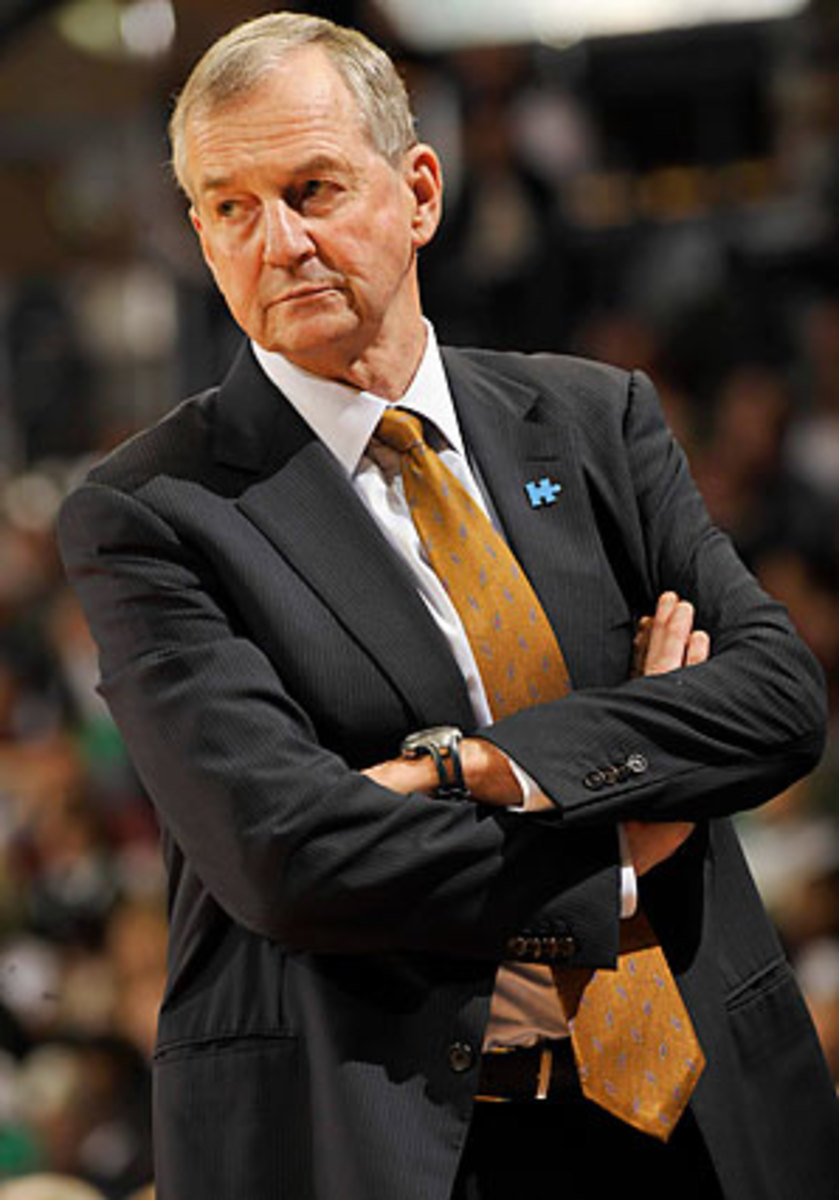NCAA allegations could ignite long-term problems for Connecticut
It's only going to get worse.
The release of the NCAA's notice of allegations detailing eight major violations may have been the end of the beginning of this case, but it was only the beginning of the end. While the university is entitled to a presumption of innocence, the school and the NCAA conducted the 15-month investigation jointly, so there is reasonable expectation that there is already a broad agreement on the facts. Now this story, which began with an investigative report by Yahoo! Sports in March 2009, will drag on through October, when Jim Calhoun and other UConn officials will have to appear before the NCAA's Committee on Infractions, and then another one to two months later when the committee issues its final verdict. At some point, UConn will have to self-impose penalties in hopes of beating the NCAA to the punch. That means lots of ugly headlines next season right up until the start of Big East play.
The penalties will be severe, though there are two reasons to believe they will fall short of a school's biggest nightmare in these cases, which is a postseason ban. The first is that the recruit at the center of this probe, Nate Miles, never suited up for Calhoun because he was expelled from UConn following allegations he abused a female student. (This might be the first time in history such an expulsion was considered a lucky break.) Second, the notice released Friday did not include the dreaded phrase "lack of institutional control." Instead, the NCAA alleged that Calhoun and the school "failed to monitor" the program's conduct and "failed to promote an atmosphere of compliance." Bad stuff, but not as bad as it could have been.
Still, the fallout will not be pretty. Even before the NCAA weighs in with its ultimate decision, UConn's coaching staff will be short two bodies because assistants Beau Archibald and Pat Sellers were forced out for allegedly lying to investigators. In addition, the forthcoming penalties are sure to include some type of restriction on recruiting as well as a reduction in scholarships. Thus, this program's ability to sign high-level players is going to be significantly compromised.
This is especially problematic because recruiting was already becoming a problem at UConn. Following a difficult season in which the team failed to reach the NCAA tournament, you would expect Calhoun to rebound with a monster haul. Yet, the only player in the Class of 2010 ranked in the top 50 on Rivals.com who committed to UConn is No. 37 Roscoe Smith, a 6-foot-7 swingman from Oak Hill Academy. Calhoun tried desperately to land a top guard prospect, but his primary targets, Brandon Knight and Josh Selby, opted for Kentucky and Kansas, respectively.
Usually, a lackluster recruiting cycle by Jim Calhoun would look like a one-year aberration. In this case, it feels like the start of a pattern. Calhoun is 68 years old, and last January he had to take an in-season temporary leave of absence for the fourth time in two years. He did sign a five-year, $13 million contract extension earlier this month, but that deal took so long to get done, it made the program appear to be less stable, not more. The contract includes a clause to permit the school to terminate Calhoun for "significant or repetitive [NCAA] violations," and though it is inconceivable that the school would actually fire Calhoun (especially considering he was not linked to any of the really major allegations), the existence of that clause will be just one more weapon that rival recruiters can use against Calhoun this summer.
Moreover, there is no obvious heir apparent to convince prospects that UConn basketball will continue to thrive after Calhoun steps down. He does have several former assistants currently coaching in Division I, but none has built a pedigree that makes you believe he is ready to take on the awesome challenge of following the man who literally built this program out of the dirt. Nor has the school designated a successor from among the current staff the way Syracuse has done with associate head coach Mike Hopkins. We don't even know if Calhoun will replace Sellers and Archibald by the time the all-important summer evaluation period begins in five weeks. So what's the case to be made that a top prospect should choose UConn over all the other high-major programs out there?
Jim Calhoun is a proud man and a great coach, and lots of people have gone poor by betting against him. But the trend lines around his program were heading in a bad direction long before Friday's revelations. At the very moment when UConn basketball needed a fresh jolt, it was delivered a devastating blow. I suspect it will be a long, long while before it fully recovers.





